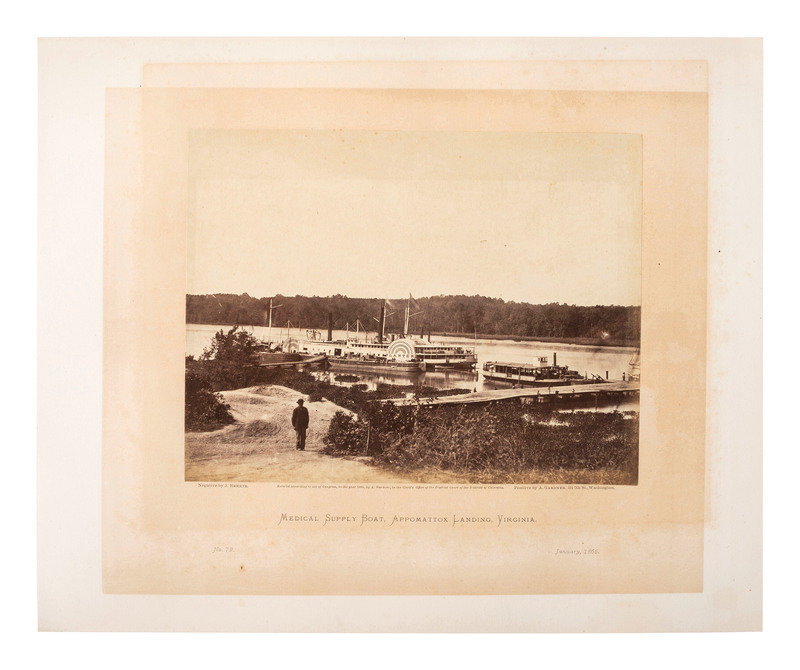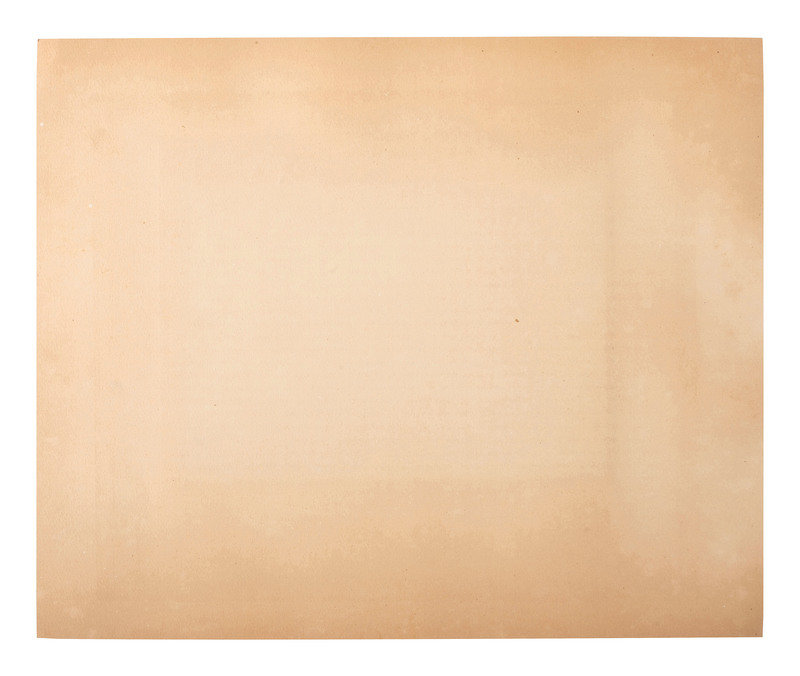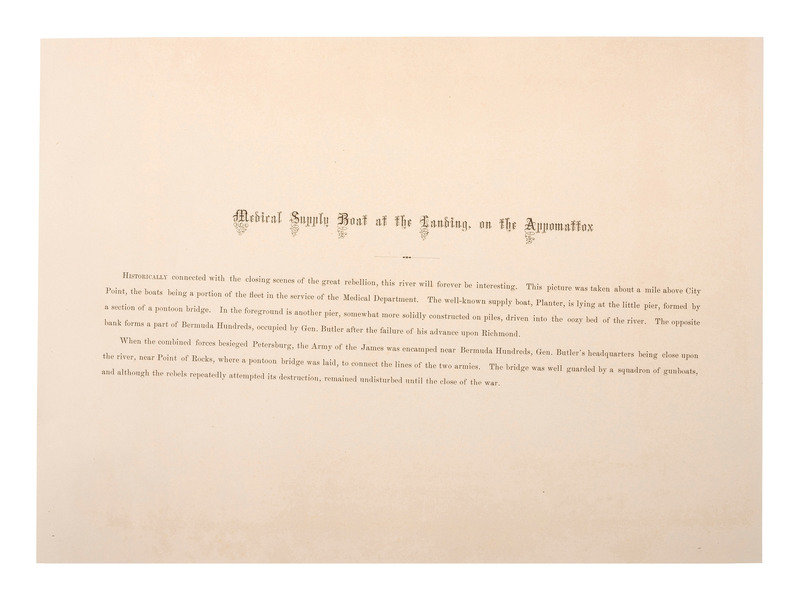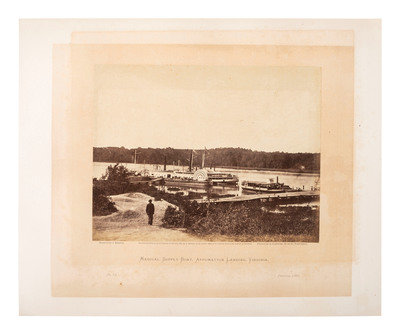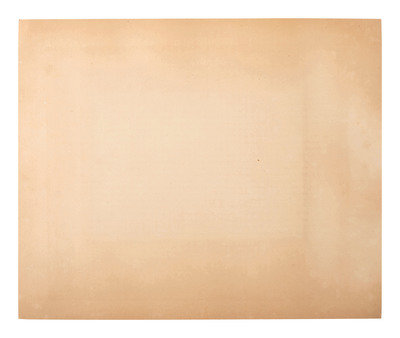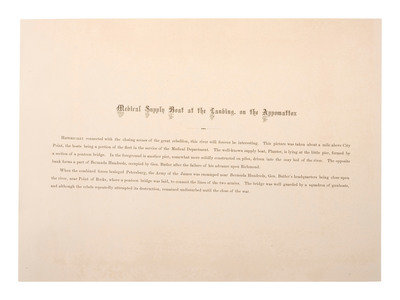Condition Report
Contact Information
Auction Specialist
Lot 68
[CIVIL WAR]. REEKIE, J. (1829-1885), photographer. Medical Supply Boat, Appomattox Landing, Virginia. January, 1865.
Sale 1095 - American Historical Ephemera & Photography, Featuring Property from the James Milgram, M.D., Collection of Broadsides, Ephemeral Americana & Historical Documents
Day 1 Lots 1-403
Nov 3, 2022
10:00AM ET
Day 2 Lots 404-634
Nov 4, 2022
10:00AM ET
Live / Cincinnati
Own a similar item?
Estimate
$300 -
500
Price Realized
$313
Sold prices are inclusive of Buyer’s Premium
Lot Description
[CIVIL WAR]. REEKIE, J. (1829-1885), photographer. Medical Supply Boat, Appomattox Landing, Virginia. January, 1865.
Washington, DC: Alexander Gardner, 1865. Photograph featuring the steamship Planter, which was previously taken over by enslaved African American Robert Smalls in 1862.
9 x 7 in. albumen photograph on 14 1/2 x 12 in. mount (toning, scattered spotting to print; toning and some corner/edge wear to mount). Mount recto with title, publication information, negative credit to Reekie, and positive credit to Gardner printed below image. Accompanied by 13 x 9 1/4 in. page describing the scene, titled "Medical Supply Boat at the Landing, on the Appomattox."
A fine view of the medical supply steamer Planter at the Hospital Wharf, Appomattox Landing, about a mile above City Point, Virginia.
Published as Plate 72 in Gardner's Photographic Sketch Book of the Civil War.
The Planter was a Confederate steamer taken over by Robert Smalls, an enslaved Southern man who steered the ship past Confederate defenses and surrendered it to Union Navy forces on 13 May 1862. Smalls, who was Planter's pilot, quietly took the ship from the wharf at Charleston, South Carolina, and with a Confederate flag flying, steamed past Confederate forts. He saluted the forts as usual by blowing the steam whistle. As soon as the steamer was out of range of the last Confederate gun, Smalls hauled down the Confederate flag and hoisted a white one. Then he turned Planter over to the USS Onward of the Union blockading force. Besides Smalls, Planter carried 15 other enslaved people to freedom behind Union lines. In addition to the cargo of artillery and explosives, Smalls brought Flag officer Samuel Francis Du Pont valuable intelligence, including word that the Confederates had abandoned defensive positions on the Stono River. Planter was enrolled in the Union Navy and sent to Port Royal Harbor, South Carolina, and DuPont later assigned Smalls as Planter's pilot. Planter served as a gunboat for the Union Navy. As the ship burned wood, a scarce commodity where the Navy was operating, the Navy turned the ship over to the Union Army for use at Fort Pulaski on the Georgia coast. In 1863 Smalls was appointed captain of the Planter, the first African American to command a United States ship, and served in that position to 1866.
9 x 7 in. albumen photograph on 14 1/2 x 12 in. mount (toning, scattered spotting to print; toning and some corner/edge wear to mount). Mount recto with title, publication information, negative credit to Reekie, and positive credit to Gardner printed below image. Accompanied by 13 x 9 1/4 in. page describing the scene, titled "Medical Supply Boat at the Landing, on the Appomattox."
A fine view of the medical supply steamer Planter at the Hospital Wharf, Appomattox Landing, about a mile above City Point, Virginia.
Published as Plate 72 in Gardner's Photographic Sketch Book of the Civil War.
The Planter was a Confederate steamer taken over by Robert Smalls, an enslaved Southern man who steered the ship past Confederate defenses and surrendered it to Union Navy forces on 13 May 1862. Smalls, who was Planter's pilot, quietly took the ship from the wharf at Charleston, South Carolina, and with a Confederate flag flying, steamed past Confederate forts. He saluted the forts as usual by blowing the steam whistle. As soon as the steamer was out of range of the last Confederate gun, Smalls hauled down the Confederate flag and hoisted a white one. Then he turned Planter over to the USS Onward of the Union blockading force. Besides Smalls, Planter carried 15 other enslaved people to freedom behind Union lines. In addition to the cargo of artillery and explosives, Smalls brought Flag officer Samuel Francis Du Pont valuable intelligence, including word that the Confederates had abandoned defensive positions on the Stono River. Planter was enrolled in the Union Navy and sent to Port Royal Harbor, South Carolina, and DuPont later assigned Smalls as Planter's pilot. Planter served as a gunboat for the Union Navy. As the ship burned wood, a scarce commodity where the Navy was operating, the Navy turned the ship over to the Union Army for use at Fort Pulaski on the Georgia coast. In 1863 Smalls was appointed captain of the Planter, the first African American to command a United States ship, and served in that position to 1866.
This lot is located in Cincinnati.
Property from William H. Itoh, collector, historian and retired Foreign Service Officer
